Top Trending Government News News & Highlights
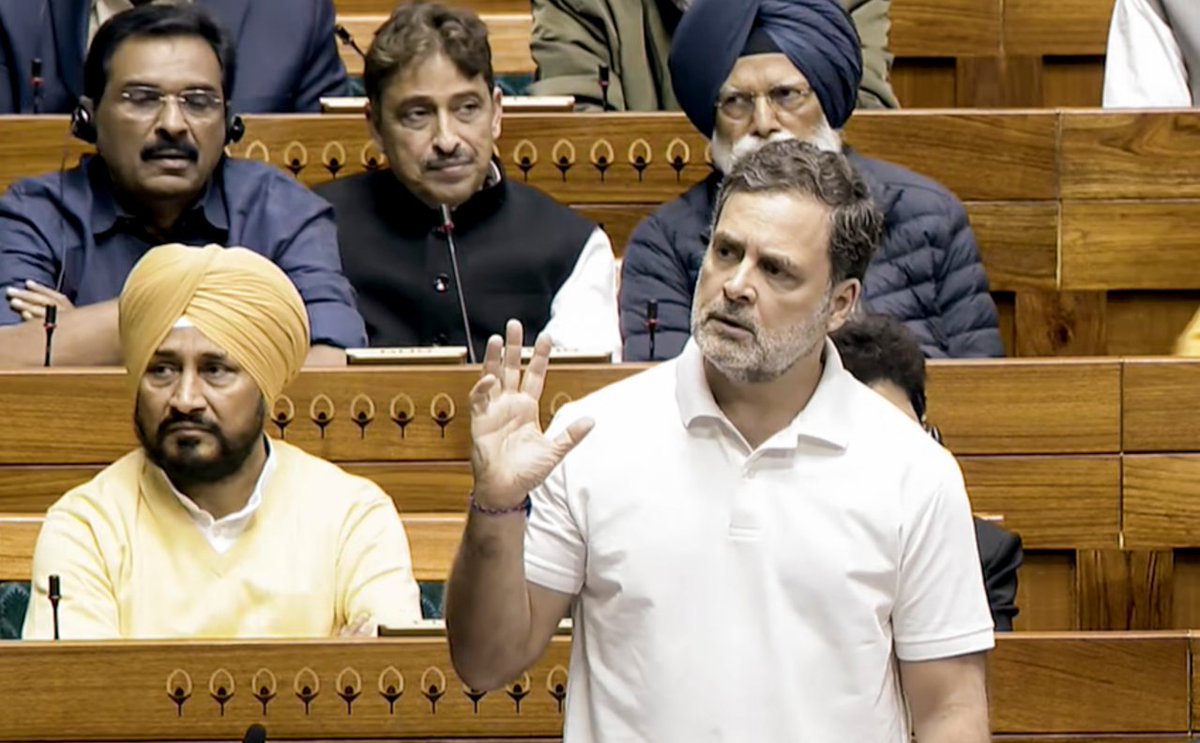

Don't you feel guilty about selling Bharat Mata Rahul Gandhi criticizes the US accord and the Center
Speaking in the Lok Sabha following days of deadlock, Rahul Gandhi criticized the Central government, led by Prime Minister Narendra Modi, for the recently concluded trade agreement with the United States, saying the administration should be embarrassed of it. In a vicious attack, Gandhi said that the Center "sold India" and that the government was endangering farmers' livelihoods by permitting US goods to enter."India is no longer yours. Do you not feel guilty for selling India? In reference to the trade deal, he declared, "You have sold our mother, Bharat Mata." He added that it was a "wholesale surrender" in which the interests of farmers were jeopardized and India's energy security was given to America. Gandhi went on to say that Donald Trump would have been advised to treat India equally if an INDIA Bloc administration had negotiated the trade deal with the US."This is total capitulation. The fact that it is a capitulation by more than simply the prime minister makes it tragic. He has given up the 1.5 billion Indians' future. Gandhi claimed that he had given up the future in order to save the BJP's financial structure, which is the subject of a case in the US.Gandhi claimed that the farmers' interests had been compromised and that they were facing a "storm" as American agricultural products flooded Indian markets. Additionally, he claimed that the Indian textile sector is "finished."We are about to enter a period of unrest, and the country has been sold. The country is sold out. "Its farmers and data have been sold," Gandhi reaffirmed as he wrapped up his remarks.Following Rahul Gandhi's address, Union Parliamentary Affairs Minister Kiren Rijiju declared that no one could sell India and charged that the Congress party was undermining the nation. "Congress is sad because India is progressing," he stated, asserting that Prime Minister Narendra Modi is India's strongest PM. He claimed that before leaving Parliament, the Congress MP gave speeches full of falsehoods and unfounded accusations. Rijiju remarked, "He never stays back to hear the minister's response."It is regrettable that we lack a serious personality or a person with a serious character that would be appropriate for the role of opposition leader. Rahul Gandhi's lies will be refuted by our party both within and outside the House.
Published 11 Feb 2026 11:10 PM
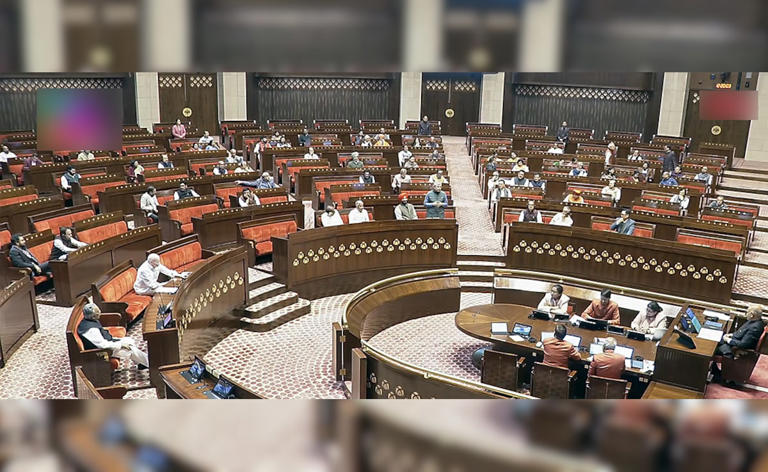

Updates for the 10th day of the Parliament Budget Session The Government-Opposition deadlock ends, and both Houses begin discussing the budget
The Lok Sabha began discussing the Union Budget on Tuesday, February 10, 2025, in the afternoon, signaling the end of the impasse between the opposition and treasury benches. The discussion had been delayed for days due to the opposition's insistence that LoP Rahul Gandhi be given the opportunity to speak on a number of topics. Following two adjournments, the House reconvened at 2 p.m., and the Speaker, Krishna Prasad Tenneti, invited Congressman Shashi Tharoor to commence the debate. The Thiruvananthapuram MP then began discussing the matter. Soon after opposition parties filed a notice to introduce a motion to oust Om Birla as Speaker of the Lok Sabha, the thaw occurred. Sukhendu Sekhar Roy of the Trinamool Congress emphasized that rising inequality could cause a "social upheaval," akin to what was seen in neighboring countries, as opposition parties criticized the government for failing to address issues like unemployment and inflation in the Union Budget during the budget discussion."If the situation is not brought under control, I fear that the country will soon experience social unrest similar to what has recently occurred in some of our neighboring countries. We have never witnessed such skyrocketing inequality between the rich, super rich, upper middle class, middle class, and the poor," Mr. Roy stated.
Published 11 Feb 2026 11:06 PM

India displays its entire armed might on the 77th Republic Day, with Operation Sindoor taking front stage on the Kartavya Path.
Top national leaders and prominent foreign visitors joined the festivities, which had as their subject 150 years of "Vande Mataram." About 10,000 distinguished guests saw the parade, which combined military might with cultural cohesion.At its 77th Republic Day parade on Monday, January 26, 2026, India put military might front and centre. Kartavya Path was transformed into a sweeping display of missiles, armour, mechanised columns, and combat aircraft, with a keen focus on weapon systems related to Operation Sindoor, the high-intensity military operation carried out in May of last year.The BrahMos supersonic cruise missile, Akash air defence system, Suryastra rocket launcher, and Arjun Main Battle Tank were among the major armament systems on exhibit at the start of the military demonstration, which emphasised India's focus on battlefield readiness and domestic defence manufacturing. A large portion of the equipment on exhibit was either used in Operation Sindoor, the confrontation with Pakistan that took place from May 7–10, or it was directly inspired by lessons learnt.A tri-services tableau featuring replicas of key weapon systems used during the operation was a big draw. A glass-cased integrated operational command centre served as its focal point, providing a visual representation of Operation Sindoor's execution through the coordinated use of systems including the S-400 air defence system and BrahMos. Akash and S-400 systems were depicted as offering a protective air-defense shield during the fight, while BrahMos missiles were predicted to perform decisive offensive attacks.Lt. General Bhavnish Kumar, a second-generation officer and General Officer Commanding, Delhi Area, led the procession. The Indian Army demonstrated a phased "Battle Array Format," including its airborne component, for the first time. The reconnaissance element included high-mobility reconnaissance vehicles after the historic 61 Cavalry in active battle uniform. Flying in Prahar formation, the domestic Dhruv Advanced Light Helicopter and its armed counterpart Rudra displayed aerial battlefield shaping.
Published 27 Jan 2026 09:07 PM
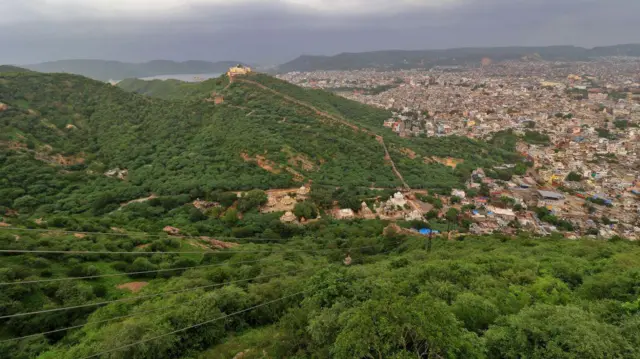

Why rising demonstrations are centered around India's Aravalli hills
The Supreme Court's redefinition of the Aravalli hills, one of the oldest geological formations in the world, which encompass the states of Rajasthan, Haryana, Gujarat, and Delhi, has sparked protests throughout northern India. Any landform rising at least 100 meters (328 feet) above the surrounding terrain is considered an Aravalli hill under the revised definition, which the court adopted in response to proposals from the federal government. An Aravalli range consists of two or more of these hills within 500 meters of one another, as well as the terrain in between. Environmentalists contend that classifying Aravalli hills according to height runs the risk of leaving many lower, scrub-covered but ecologically significant slopes vulnerable to mining and development. However, according to the federal government, the new definition is intended to increase uniformity and reinforce regulations rather than weaken rights.Protests have erupted across northern India after the Supreme Court redefined the Aravalli hills - one of the world's oldest geological formations spanning the states of Rajasthan, Haryana, Gujarat, and the capital, Delhi.
Published 22 Dec 2025 10:25 PM


Government News
Government News & Trends where we share you the latest updates under the government authorities globally starting from India to USA, China, Russia, Pakistan, UK and many more nations.


BJP kept saying hum Ram ko laaye hain, the reality is they did business in the name of Ram, said SP's Ayodhya winner.
Caste was not prominent, according to Awadhesh Prasad, a Dalit politician who emerged victorious in the general election in Faizabad. People did not like Lallu Singh's statement that the BJP needed 400 seats to amend the Constitution.One of the highlights of the Samajwadi Party's (SP) triumph in the Uttar Pradesh Lok Sabha elections over the Bharatiya Janata Party (BJP) was its win in the Faizabad Lok Sabha constituency, which includes Ayodhya. Two-time MP Lallu Singh was beaten by experienced MLA Awadhesh Prasad, a member of the SP's founding party, with a margin of 54,567 votes. In Uttar Pradesh, Prasad was the only Dalit candidate to become victorious from a non-reserved seat.Prasad's victory is seen as an ideological gain for the SP and the INDIA alliance because the BJP fought a prestige war over Ayodhya, home of the Ram Temple. Following his triumph, Prasad's admirers and supporters have flocked to his house; some have brought flowers, while others have brought pictures of Mulayam Singh Yadav and B R Ambedkar. Speaking with The Indian Express, Prasad touches on a number of topics, including the significance of his triumph, the Ram Temple controversy, and his mother Maina Devi, who passed away while he was imprisoned during the Emergency.In Uttar Pradesh, Prasad was the only Dalit candidate to become victorious from a non-reserved seat. Prasad's victory is seen as an ideological gain for the SP and the INDIA bloc because the Ram Temple's location in Ayodhya was a point of pride for the BJP.


Live Analysis of the Lok Sabha Election Results in 2024 India bloc resists and disobeys exit polls
Live Updates on the 2024 Lok Sabha Election Results Analysis: The BJP's anticipated advances in the southern states and significant victories in West Bengal, where regional parties predominate, will also be fascinating to watch.Live Updates on the 2024 Lok Sabha Election Results Analysis: The opposition parties in India are continuing to defy exit poll forecasts, and they are putting up a fight. The INDIA alliance was ahead in 223 seats, while the BJP was leading in 292 seats in a nearly tie. The Congress's success in Rajasthan, where it appears to be ending its losing streak, is an intriguing trend to watch. It's interesting to see that its Jat candidates had more than half the leads.According to numerous exit polls, Prime Minister Narendra Modi is expected to serve a third term. The strength of the ruling coalition, its ability to expand into previously unclaimed territory, and its ability to live up to its "400 paar" slogan, however, are what are at risk. With the Opposition consolidating into the INDIA bloc and seeking to upset the NDA's tally, the stakes are considerably higher. The opposition has disregarded the exit poll forecasts and placed more trust in "people's polls."It remains to be seen whether the opposition is aided by the alleged "undercurrent" against the governing administration. The BJP's anticipated advances in the southern states and significant victories in West Bengal, where regional parties predominate, will also be fascinating to watch. Continue reading for our political editors' and reporters' real-time commentary to help you make sense of the rapidly increasing numbers.


Lok Sabha Elections 2024 PM Modi to meditate at Vivekananda Rock Memorial after high-octane campaign ends tomorrow
According to rumors, Prime Minister Narendra Modi would conclude his campaign for the Lok Sabha Elections of 2024 with a 48-hour spiritual retreat at the Vivekananda Rock Memorial in Tamil Nadu. The Prime Minister, the most well-known spokesperson for the ruling Bharatiya Janata Party (BJP), is scheduled to arrive at the scenic memorial off the coast of Kanyakumari on May 30. On June 1, the final day of voting, he may depart for Delhi, according to reports citing sources. On Wednesday, May 30, the seven-phase Lok Sabha Elections 2024 campaign comes to a finish. On June 4, the results will be made public. According to a report by NDTV, the 73-year-old prime minister will practice meditation at the Dhyan Mandapam, the Memorial's auditorium, from May 30 to June 1. The Memorial holds spiritual significance as it is thought that Swami Vivekananda spent three days in meditation on a rock at the confluence of the Arabian Sea, Bay of Bengal, and Indian Ocean, some 500 meters off the mainland, following his travels around the nation. It is reported that Vivekananda reached enlightenment here. On May 25, the sixth phase of voting concluded for 486 of the 543 Lok Sabha seats. Under Prime Minister Narendra Modi, the BJP-led NDA is vying for a record-breaking third term and hopes to capture 400 seats. The Congress-led opposition parties, united under the INDIA bloc banner, pose a threat to the ruling coalition. On June 1, 2024, the seventh and final round of the Lok Sabha elections will take place. Voters from 57 Lok Sabha constituencies spanning across eight states and UT will exercise their right to vote during the seventh phase of election. On June 1, elections will also take place in Varanasi, the Uttar Pradesh seat that PM Modi now holds. Ahead of the 2019 Lok Sabha Election results, Prime Minister Modi was shown meditating in a sacred cave close to Kedarnath, Uttarakhand, while wearing saffron robes. In the 543-member Lok Sabha in 2019, the BJP secured 303 seats, securing a resounding majority.


The DRDO Chairman receives a one-year extension following the Army Chief.
New Delhi: The government's cabinet nomination committee is busy conducting many reshuffles while the entire nation is preoccupied with the general election. A day after Army Chief General Manoj C. Pande was given a one-month service extension to June 30 by the cabinet appointment committee, a crucial decision about the DRDO chief was made.*Dr. Samir V Kamat*, Secretary, Department of Defence Research and Development (DDR&D) and Chairman, Defence Research Development Organization (DRDO), has had his service/tenure extended by the Modi administration for a year, from June 1, 2024, to May 31, 2025. The extension is given while his successor is still up for election.In addition to this, the following are further appointments and recommendations that were announced on Monday, May 27, 2024:*Amit Garg*, (1993-AP) IPS: After May 31, 2024, or until a regular incumbent is appointed, the Addl. Director, SVP NPA, shall remain in extra control of the position for an additional three months.


Delhi nears 50 degrees Celsius What's causing extreme heat in capital
Due to a serious water deficit in the nation's capital, the Delhi government has asked the Supreme Court for an extra month's worth of water supplies from Haryana, Uttar Pradesh, and Himachal Pradesh.Delhi's thirst for water has grown due to the intense heat. The petition stated that it is everyone's duty to provide for the capital of the nation.There is a severe water deficit in several parts of Delhi, notably the Sanjay Camp neighborhood in Chanakyapuri and the Geeta colony neighborhood. Long lines of people wait in the intense heat in hopes of filling at least one bucket, as tankers arrive and depart without sufficiently feeding the vast numbers of people living in the colonies.The national capital of India's highest temperature is getting dangerously near to 50 degrees Celsius at the moment of the water crisis. At 2.8 degrees above average, the minimum temperature is almost 30 degrees Celsius. According to the weather office, there will be heatwave conditions in the nation's capital for the next several days. People are encouraged to limit their exposure to the heat and drink plenty of water.The AAP-led Delhi government established 200 squads to execute the ₹ 2,000 punishment for water waste on Wednesday.


Man from Bihar Dies in Delhi Hospital From Heat, Temperature Reached 107°C
A 40-year-old man from Darbhanga, Bihar, passed away yesterday at the Ram Manohar Lohia hospital in Delhi, following a heatstroke he sustained during the city's record-breaking heatwave. Late on Monday night, the man was admitted to the hospital. He had a high fever and lived in a room without a fan or cooler, according to the doctor who treated him. According to the doctor, the body temperature exceeded 107 degrees Celsius, which is almost 10 degrees higher than usual. This summer's first heat-stroke fatality in Delhi has been documented. With all-time high power consumption, record-breaking temperatures, and a dire water problem, the nation's capital has been experiencing a summer nightmare. The highest temperature ever recorded by any weather station in the nation was 52.9 degrees Celsius, which was reported at the Mungeshpur weather station on the outskirts of the city. The weather bureau is currently looking into whether a local factor or a sensor mistake caused the record reading at the Mungeshpur station. Man from Bihar Dies in Delhi Hospital From Heat, Temperature Reached 107°C A 40-year-old man from Darbhanga, Bihar, passed away yesterday at the Ram Manohar Lohia hospital in Delhi, following a heatstroke he sustained during the city's record-breaking heatwave. Late on Monday night, the man was admitted to the hospital. He had a high fever and lived in a room without a fan or cooler, according to the doctor who treated him. According to the doctor, the body temperature exceeded 107 degrees Celsius, which is almost 10 degrees higher than usual. This summer's first heat-stroke fatality in Delhi has been documented. With all-time high power consumption, record-breaking temperatures, and a dire water problem, the nation's capital has been experiencing a summer nightmare. The weather in Mungeshpur


Interview with Arvind Kejriwal The PM alone can decide how long he wants me to stay in jail.The governments of Mamata and Pinarayi will fall next if I resign (as CMS).
Arvind Kejriwal, the chief minister of Delhi, discusses his plans to "run democracy" from inside Tihar Jail, what a third term under Prime Minister Modi would entail, and why he believes the BJP will not win a majority. Revised passages:The nation is currently going through a really trying period. The nation is headed toward dictatorship, first slowly and then swiftly. I was detained second by them (the central BJP government) after Hemant Soren, the former chief minister of Jharkhand, was. They are sending a message to the nation by detaining me: if they can arrest Kejriwal on fabricated charges, they can arrest anyone. People ought to obey them and be afraid of them. These are indicators of autocratic rule. They should listen to people in a democracy, yet they are requesting that people do just that. The nation must be saved from this by us. This reminds me a bit of the struggle for freedom. Many of the people who motivate me now were imprisoned forThe entire body of criminal jurisprudence has been completely upended by the PMLA Act. Up until now, a criminal matter would be brought before the court, a FIR would be filed, an investigation would be conducted, and the verdict would determine whether the accused was guilty or innocent. Then and only then would the guilty get punished. Currently, the roles are reversed. On the first day, a FIR is filed and anyone who is suspected is taken into custody. After that, the inquiry carries on, and he is still detained. A person is only released from custody after they are found not guilty in court. The PMLA states this. So nobody is being granted bail. And since all of the cases are false, there is no conviction rate. This legislation was introducedthe Aam Aadmi Party's amazing ascent. Numerous individuals, including our friends, who have met the PM, inform us that the PM talks about AAP on a regular basis. Additionally, he claims that AAP will confront them both nationally and in other states in the future. Their goal is to eliminate AAP before it has a chance to spread. AAP leaders are being detained as part of "operation jhaadu," which they are now conducting. According to a statement made by Mr. Raju (Additional Solicitor General S V Raju), our accounts will be seized following the elections. The process of leaving our office is under progress. However, they fail to realize that the AAP is no longer a four-person party. Now, this idea is becoming more and more popular.


Prime Minister Narendra Modi said, I am convinced that my energy is not biological. God has sent me.
To counter the ardent opposition and emphasize the achievements of his government over the past ten years, Prime Minister Modi has been actively engaging with various media platforms and news channels in an effort to garner support for his Bharatiya Janata Party-led National Democratic Alliance (NDA).Throughout the 2018 Lok Sabha elections, Narendra Modi is going all out in an attempt to win an unprecedented third term as India's prime minister. To counter the ardent opposition and emphasize the achievements of his government over the past ten years, Prime Minister Modi has been actively engaging with various media platforms and news channels in an effort to garner support for his Bharatiya Janata Party-led National Democratic Alliance (NDA).


Dr. Bikramjit Chaudhuri has been appointed as the new chief of measurement science and analytics by BARC India.
Dr. Bikramjit Chaudhuri is the new Chief of measuring Science & Analytics at the world's largest television audience measuring agency, the Broadcast Audience Research Council (BARC) India. He will take over for Dr. Derrick Gray, a distinguished team member of BARC India for the past six years and a seasoned expert in audience measurement and advanced analytics.Dr. Bikramjit Chaudhuri is the new Chief of measuring Science & Analytics at the world's largest television audience measuring agency, the Broadcast Audience Research Council (BARC) India. He will take over for Dr. Derrick Gray, a distinguished team member of BARC India for the past six years and a seasoned expert in audience measurement and advanced analytics.Dr. Bikramjit Chaudhuri: An Experienced Expert Dr. Chaudhuri graduated with a Master of Statistics from the Indian Statistical Institute in Delhi and a Ph.D. from IIT Bombay. He brings with him an extensive background spanning more than thirty years in a variety of domains, including demand forecasting, artificial intelligence (AI) and machine learning (ML), statistics, stochastic modeling, market measurement, and consumer segmentation. In these fields, he is the author of several research papers, publications, and patents. Dr. Chaudhuri has served as the Global Head of Data Science & Advanced Analytics for the Datamatics Group of Companies since 2016. Before working at Datamatics, he was a senior professional at KPMG, Nielsen, and ZS Associates, where he led teams of professionals in a variety of leadership roles.Accepting the New Task "It will be an absolute honor and privilege to be a part of a multitalented and versatile team that runs the largest Audience Measurement system in the world, in one of the most complex multimedia markets," Dr. Chaudhuri remarked, expressing his excitement. I'm excited to use my broad experience and in-depth knowledge to advance the current measuring system and satisfy the expanding demands of the market. Anticipating a thrilling voyage and a rewarding partnership with BARC India.


The government has changed the schedule for borrowing Treasury bills for the next six weeks and announced three buybacks of short-term securities within the last three weeks.
The government has changed the schedule for borrowing Treasury bills for the next six weeks and announced three buybacks of short-term securities within the last three weeks.According to two people with knowledge of the situation, India's federal government's spending is probably going to slow down for a few more months, which could lead to additional measures to inject money into the banking system. The government has changed the schedule for borrowing Treasury bills for the next six weeks and announced three buybacks of short-term securities within the last three weeks.One of the individuals, a government official who wished to remain anonymous because he is not permitted to speak to the media, stated, "We see slow pace of spending till about August."


Arriving at Arvind Kejriwals house, Raghav Chadha makes his first appearance following eye surgery.
On Saturday, May 18, Aam Aadmi Party (AAP) MP Raghav Chadha visited Delhi Chief Minister Arvind Kejriwal's home for the first time following eye surgery he had in the UK.Chadha had spent a considerable amount of time away following eye surgery in Britain. His absence was also questioned, but the party stated he would return after his recuperation.A Delhi minister said last month that the MP had suffered a severe eye condition that might have resulted in blindness.Raghav Chadha had serious eye surgery in the UK, according to Delhi Health Minister Saurabh Bharadwaj, who also stated in April that he would join the party's Lok Sabha election campaign after he recovered. He disclosed that the MP had developed a severe condition affecting the eyes that would have resulted in blindness.The Punjabi MP for the AAP, Chadha, has not been present during the party's election campaign."In the UK, Raghav Chadha had a significant eye procedure. His condition was very grave, and blindness was a real possibility. He would return to India as soon as he recovers and assist us in the election campaign, Bharadwaj told PTI.When asked if Chadha would be participating in the election campaign, Mann responded, "He will definitely campaign.""Eleven players are involved in cricket. Then there are four additional players, the coaching staff, and those who bat and bowl in the nets. Everyone is carrying out their duties," he remarked.Also confirming that Raghav Chadha will run for the party in the general assembly elections is Punjab Chief Minister Bhagwant Mann."We are an organization, and everyone who is given a task will complete it. The Punjab chief minister continued, "AAP will become a powerful political force on June 4.


Senior IPS officers N. Venu Gopal and A.Y.V. Krishna have been named additional directors in the CBI.
A Y V Krishna and N Venu Gopal, two senior Indian Police Service (IPS) officers, have been named as new directors of the Central Bureau of Investigation (CBI).The appointment of senior Indian Police Service (IPS) officials A Y V Krishna and N Venu Gopal as additional directors in the Central Bureau of Investigation (CBI) is a noteworthy step. Their nominations demonstrate the government's dedication to strengthening the top investigative agency's investigation skills.The CBI Appoints A Y V Krishna as a Director The CBI has nominated A Y V Krishna, a renowned IPS officer from the Assam-Meghalaya cadre who graduated in 1995, as an additional director. Krishna brings a wealth of experience and knowledge to his current position as Inspector General of the Central Reserve Police Force (CRPF). His appointment as an additional director is valid until August 6, 2028, per the Personnel Ministry's directive.N Venu Gopal's Consultation N An additional director in the CBI has also been appointed: Venu Gopal, a seasoned Himachal Pradesh cadre IPS officer. In his capacity as the CBI's joint director, Venu Gopal has proven to be an excellent leader and investigator. As per an extra order issued by the Personnel Ministry, his employment as an additional director is valid until May 24, 2027. The government prioritizes bolstering the CBI The government's priority on fortifying the Central Bureau of Investigation is shown in the appointments of A Y V Krishna and N Venu Gopal. Due to their established backgrounds in law enforcement and investigative procedures, both officers will be highly valuable in helping the CBI fulfill its mission of enforcing the law and fighting crime on a national scale.Goals and Obstacles A Y V Krishna and N Venu Gopal, as additional directors in the CBI, are expected to handle complicated investigations, work with other law enforcement agencies, and maintain the highest standards of professionalism and integrity. They will be essential in improving the CBI's ability to combat financial crimes, corruption, and other severe crimes with efficacy and efficiency.
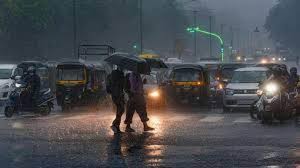

IMD issued a red signal for heavy rainfall through May 21 and the possibility of a heatwave in UPs Haryana.
Updates on the Latest News Today Live: On this platform, we compile news for you from a variety of sources. Here, we provide you with up-to-date information on both local and international events, including the most recent advancements. We can provide you with important political news, crucial economic reports, company highlights, and/or breaking news alerts. Stay tuned for our ongoing coverage, professional analysis, and expert views. With our thorough and timely news coverage, never miss a beat.The IMD bulletin states that throughout the next five days, heatwave conditions are expected to impact portions of Uttar Pradesh, Gujarat, Bihar, Jharkhand, and Madhya Pradesh. It is probable that heatwaves may also affect Odisha and Gangetic West Bengal on May 20–21.From May 16 to May 18, heatwave conditions are expected in several northern and northwest states, including Punjab, Haryana, Uttar Pradesh, and Delhi, according to the India Meteorological Department (IMD). The IMD prediction predicts that till Saturday, May 18, the temperature in Delhi and the surrounding states will climb steadily. The MeT department reported that over the weekend, the temperature in Delhi is probably going to reach 45 degrees Celsius. Dry westerly and northwesterly breezes, along with clear skies that allow for direct sunshine in northern states starting on Thursday, have been blamed for the skyrocketing temperature.Since there isn't projected to be any rain or western disturbance, the mercury has been climbing in Delhi over the previous three days and is likely to stay there into the weekend. By Friday, the highest might be 44°C, and on Saturday, it might be 45°C. An IMD representative stated that certain stations might fit the description of a heatwave.The most recent IMD forecast states that a heatwave will affect western Rajasthan from May 15 to May 18, and that a heatwave will affect western Uttar Pradesh, Punjab, and southern Haryana from this morning until Saturday.


Live blog for SBFC Finance Share Price on May 17, 2024
Live updates on the share price of SBFC Finance today: The price of SBFC Finance's shares decreased by 3.19% today, May 17, 2024. Shares of the stock closed at 84.29. At the moment, the stock is selling at 81.6 per share. In the upcoming days and weeks, investors should keep a close eye on SBFC Finance's stock price to see how it responds to the news.Live updates on the share price of SBFC Finance today: With an opening price of ₹84.34 and a closing price of ₹84.29, SBFC Finance had a steady day. The shares closed at ₹81.10, having touched a high of ₹84.34. With ₹8746.61 crore, the market capitalization was recorded. The values for the 52-week high and low were ₹97.99 and ₹72.23, respectively. There were 143,247 shares traded on the BSE during the day.Live share price for SBFC Finance today: short- and long-term trends Live share price for SBFC Finance today: The technical analysis indicates that the SBFC Finance share's short-term and long-term trends are both bearish.Live Updates on SBFC Finance Share Price: Hold is the consensus analyst rating. Live Updates on SBFC Finance Share Price: The trend of analyst recommendations is displayed here, with a hold rating as of right now. 10.29% more than the current market price, at ₹90.0, is the consensus price goal. ₹80.0 is the lowest target price according to analyst forecasts. ₹115.0 is the highest goal price according to analyst forecasts.Live updates on the price of SBFC Finance shares: SBFC Finance share price live: The price range as of today Live Updates on SBFC Finance Share Price: The day's high and low for the SBFC Finance shares were ₹84.34 and ₹81.1, respectively.Live Updates on SBFC Finance Share Price: Peers in Stock Live Updates on SBFC Finance Share Price: The stock price of SBFC Finance fell by 3.19% today to ₹81.6, however the tendencies of its competitors are different. While Crop Life Science, Trident Techlabs, and Shri Balaji Valve Components are witnessing growth, Sahaj Fashions and Chavda Infra are seeing declines. The major indices, the Nifty and Sensex, have generally increased by 0.25% and 0.37%, respectively.
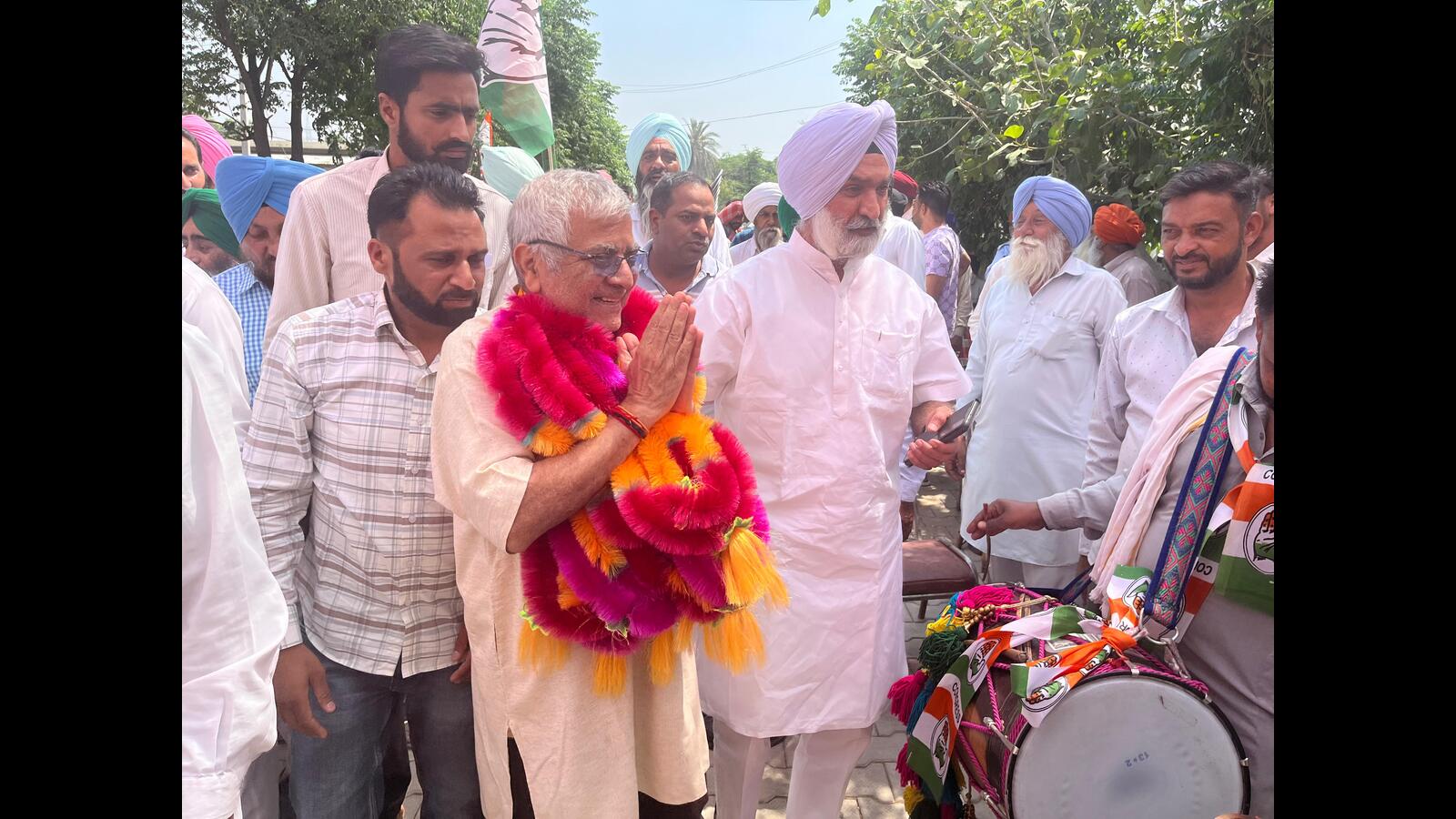

The nation is threatened by the Modi administration. Gandhi, Dr. Dharamvira
Gandhi made fun of the AAP-led state administration in Punjab, claiming that rather than delivering services to the populace, it is making the state's debt worse.During his campaign trail in Dera Bassi on Tuesday, Congress candidate for Patiala Lok Sabha Dr. Dharamvira Gandhi charged that the national government had anti-farmer and anti-democratic agendas.Gandhi traveled to several villages in the Dera Bassi constituency, including Karkaur, Bhankharpur, Haripur Hinduan, Samgauli, Mirpur, Mubarikpur, and Gulabgarh.Gandhi declared: "It is imperative that every citizen work toward the overthrow of the BJP government, which is anti-farmer, anti-labor, and believes in dividing people in the name of religion and caste."Gandhi made fun of the AAP-led state administration in Punjab by claiming that it is growing the state's debt rather than delivering services to the populace.Gandhi continued, "The strength of the people will carry me to the Parliament, and if I win, I will bring development projects for Dera Bassi, which currently needs a lot of upliftment, including infrastructure for health and education. "According to the Swaminathan Commission report, Gandhi assured farmers of a legally binding guarantee of the minimum support price (MSP) after forming the central government.Gandhi charged that PM Modi was betraying farmers and paying off businessmen' loans, saying that "both the BJP and AAP have treated farmers as enemies." While Modi cancelled Ambani and Adani's loans, the Congress party would cancel all of the debt owed by laborers and farmers.
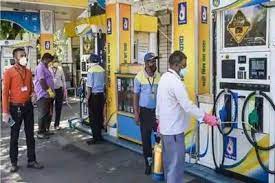

Check Out The Best City-By-City (Delhi, Noida, Mumbai, Chennai, Kolkata) Gas Prices In India
In Mumbai, India, the cost of 14.2 kg of domestic LPG is ₹802.50. The price of LPG has not changed from the previous month. Since March 2024, the price of LPG has been constant at ₹802.50. The LPG price trend has been declining over the last 12 months, falling ₹300 between June 2023 and May 2024. In August 2023, the price dropped by ₹200, the most amount. Visit https://www.goodreturns.in/lpg-price.html to learn more.The state-run oil corporations in India set the price of LPG, and they update it every month. In India, practically every home has an LPG hookup, which is mostly utilized for cooking. The average person will be impacted by an increase in LPG costs since, under the current market conditions, they bear the burden of increased fuel costs. The best thing is that consumers can already purchase home LPG cylinders at a discounted price thanks to an Indian government subsidy. Following the purchase of the cylinder, the subsidy amount is instantly credited to the individual's bank account. The monthly subsidy amount is subject to fluctuations in the average international benchmark LPG prices.The state-run oil corporations in India set the price of LPG (Liquified Petroleum Gas), which is updated every month. The cost of LPG is significant since it directly affects average people's kitchens. Nearly every home has an LPG connection, as do hotels and restaurants that are used for business purposes. Since they suffer the brunt of the growing fuel prices, even a slight fluctuation in price might set off a massive chain reaction across the nation. LPG is priced differently for residential and commercial use. When compared to household use LPG cylinders, commercial LPG is significantly more expensive. Visit https://www.goodreturns.in/lpg-price.html to learn more.The two main variables that determine the cost of LPG cylinders in India are the rupee's value in relation to the US dollar and the global benchmark rate. Each family is eligible for up to 12 free cylinders annually. You have to pay market price for any additional cylinders that you require. LPG prices in India are based on the global market price from the previous month. Visit https://www.goodreturns.in/lpg-price.html to learn more.Currently, domestic users are receiving the subsidy from the Indian government. The money is deposited straight into the recipient's account, which is the nicest aspect of the subsidy. The amount of the subsidy varies from month to month based on fluctuations in the foreign exchange rate and average worldwide benchmark LPG costs. The top three companies in the nation for LPG gas cylinder connections are HP Gas (owned by Hindustan Petroleum Corporation Limited), Indane Gas (owned by Indian Oil Corporation Limited), and Bharat Gas (owned by Bharat Petroleum Gas). Visit https://www.goodreturns.in/lpg-price.html to learn more.


Interview with Eknath Shinde I should gain credit for that because Uddhav is no longer wearing his neck collar and is walking about.
With less than two months left in his tenure as Chief Minister of Maharashtra, Eknath Shinde is going all out in his campaign. Shinde talks about Uddhav Thackeray, the Maratha quota issue, the prospects for the ruling Mahayuti alliance in the state, and the opposition's claim that the BJP wants to amend the Constitution if it wins back power in the state as 11 constituencies in Maharashtra go to polls on Monday for the fourth phase of the election.The Opposition is conducting all of the conversations outside. We will have more seats than the previous time, I'm sure of it. This is as a result of the work we have done over the past two years. Prior to the election of our government, almost all work was on hold. We are concentrating on all parties involved today, including women and farmers as well as young people and senior persons. The work of Prime Minister Narendra Modi (Modi ji) throughout the past ten years and our government's recent two years have been noticed by the public. We have a lot of plans for developing infrastructure in the future. Our goal is to strengthen the country and restore Modi ji to his position as prime minister. This holds significance for the advancement of a nation.It is a subjective matter. The Opposition began spreading rumors that the Constitution will be altered as soon as they realized they would not win the election. Is it possible to amend the Constitution, in your opinion? The Congress has amended the Constitution 82 times. Babasaheb, who opposed the Congress and declared that it was like a burning house, was defeated by the Congress in elections. Constitution Day: Who started it? It was Modi.


School Holidays Delhi, Haryana Schools Start Their Winter Break Today
Delhi's schools will be closed for the winter starting today, January 1, 2024. The winter break will go through January 6. Delhi schools now only have six days off this year instead of the previous fifteen. This is because the national capital's extreme air pollution forced a section of the winter vacation to be rescheduled from November 9 to November 18. "Nevertheless, a portion of winter vacation was observed from November 9 to November 18 to ensure that our students are not adversely affected due to the poor air quality in Delhi," the Department of Education stated.Additionally, the state of Haryana has stated that all public and private schools in the state will be closed for winter break beginning today. The state's schools will be closed from January 1 to January 15 for a total of 15 days. "The Haryana government has announced winter vacation from January 1 to January 15, 2024 in all government and private schools of the state," the Haryana Chief Minister's Office had stated, citing the growing cold. There will be no schooling during this time.Winter vacations are predicted to rise in many states because of the anticipated sharp decrease in temperature at the start of the year. There will be ample time for students to study for the exams, which are scheduled for February and March of 2024. Schools will reopen in the second week if the weather clears up. In the event that this doesn't occur, holidays will continue until January 14, 2024. Following this, during holidays like Lohri and Makar Sankranti, schools will be closed for business during the third week. In addition, numerous states will observe holidays in honor of Guru Gobind Singh Jayanti.


















